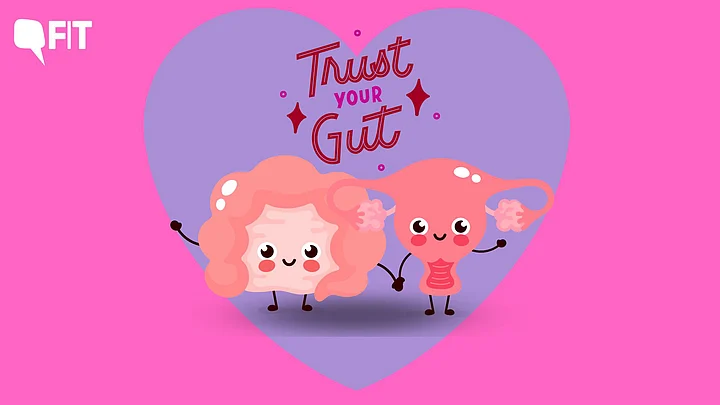When we experience excruciating pain during menstruation, we usually look up for topics around reducing period pain, and most of it ends up being a quick but temporary solution.
But before digging into that ice cream tub or a having a nice slice of pizza, that might feel comforting in that moment think about this — is it just your uterus or is it your gut health affecting your hormonal health and menstrual cycle?
Both organs have a completely different role to play, right? So, how exactly are hormones and gut health even connected?
FIT spoke to Dr Vinieta Diwakar, Consultant, OB/GYN, Manipal Hospitals, Ghaziabad, and Dr Poonguzhali Liston, MS OB/GYN with, Advanced Diploma in ART and RM, Kindly.
These two experts help us understand the connection between the two things while giving out tips for its management.
How does menstruation affect gut health?
Cyclical gut symptoms during the menstrual cycle are common, both in healthy, usually non-symptomatic women and women with gut conditions like inflammatory bowel disease or syndrome.
"Hormone levels change during and between periods. A week before period arrives, there is a spike in progesterone levels which acts as a muscle relaxant. This relaxes the colon and slows transit of food in intestines, which causes bloating and constipation."Dr Poonguzhali Liston is MS OB/GYN with, Advanced diploma in ART and RM, Kindly
Then, estrogen levels dip just before period, which can slow down digestion.
During menstruation there is release of a locally acting hormone called prostaglandin.
Dr Poonguzhali explains that prostaglandins not only cause the uterus to contract, and shed its lining. It also causes the contraction of smooth muscles of the gut, which can lead to cramping and diarrhoea. The drop in estrogen and progesterone can also increase sensitivity to pain.
After periods, your estrogen levels start increasing again. These changes may cause your digestive tract to spasm and increase gastric motility. This can lead to diarrhoea.
What is intestinal microbiome? How does it affect the hormones?
Microbiome means, a world of bacteria, fungi, and viruses present in different canals of the body – basically, the good gut organisms.
Dr Vinieta Diwakar says that "some of them have the capacity to produce an enzyme beta glucocerebrosidase – which can reactivate the inactivated estrogen."
"The estrogen is formed by the ovaries, deactivated by the liver, and then entered in the gut as a part of the excretory process to be excluded in the stools."Dr Vinieta Diwakar, Consultant - OB/GYN, Manipal Hospitals, Ghaziabad
The reactivated estrogen molecule will be reabsorbed, and enter the blood circulation. When levels of estrogen increase in the body, they disturb the balance of controlling signals affecting the ovaries. It may lead to hormonal imbalance and its consequences.
If summarized, the intestinal microbiota influences the following processes in the body:
Digestion and absorption of nutrients
Regulating the immune system
Regulation of inflammation
Appetite regulation
Modulation of nervous system
Synthesis of vitamins and amino -acids
Control of various hormones
How does a severe gut health make mental health issues worse when menstruating? How severe can it get?
Dr Vinieta Diwakar says that "there is a direct relationship between the brain and gut health and it is going to affect your mental health."
It has been proven scientifically that the spectrum varies from a little mood swing to severe suicidal tendencies. So, if you think you have premenstrual syndromes and your gut health is not good during menstruation, stick to all the foods to be consumed or avoided along with mental relaxation techniques like yoga and meditation.
What type of food one should have and avoid when on their period?
Here's what you should have during your period, apart from fruits and leafy green vegetables:
Ginger
It has anti-inflammatory effects which help in reducing cramps. It also reduces nausea.
Fish and chicken
Proten helps with general well-being. Fish is rich in omega -3 fatty acid , which is shown to reduce menstrual pain and is also good for reducing mood swings and depression around menstruation.
Lentils and beans
Lentils and beans are rich in protein, so they are good meat replacements for vegans and vegetarians. They are also rich in iron.
Turmeric
Turmeric is known as an anti-inflammatory spice and it reduces PMS.
Dark chocolate
Dark chocolate is rich in iron and magnesium. Studies show magnesium reduces the severity of premenstrual symptoms. It is also known to increase endorphins.
Peppermint tea
It known to soothe premenstrual symptoms and can relieve menstrual cramps, nausea, and diarrhoea.
Probiotics
Probiotics are required to maintain good gut health which in turn reduces symptoms of high estrogen .Many people get yeast infections during or after their period, probiotic-rich foods like yogurt can nourish the “good” bacteria in your vagina and may help you fight the infections.
What to avoid?
Salt
Salt cause water retention which in turn leads to bloating To reduce bloating, reduce salt intake starting a week before the start of periods.
Sugar
Excessive sugar intake can lead to a sugar rush followed by a crash. This can worsen the mood
Spicy foods
It exacerbates the symptoms of periods like bloating, cramps, diarrhoea and stomach pain.
Coffee
Caffeine can cause water retention and bloating. It can also exacerbate headaches which are a common occurrence during periods. Avoid coffee if diarrhea or digestive are a symptoms during periods. A complete withdrawal is not advised either for people who are used to having a few cups a day as it can cause caffeine withdrawal headaches.
Red meat
Red meat is high in prostaglandins which increase the contraction of muscles and can worsen the cramps.
Alcohol
Alcohol causes dehydration which worsens headaches and bloating that occurs during periods. It can also worsen diarrhoea and nausea.
(At The Quint, we question everything. Play an active role in shaping our journalism by becoming a member today.)
